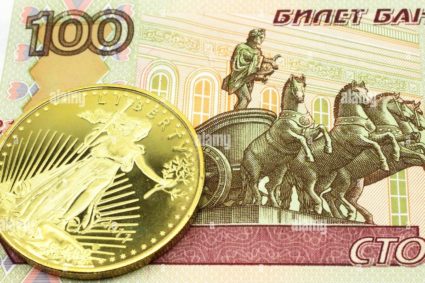Russia making moves toward sound money by pegging the ruble to gold might turn the global trading economy on its ear.
April 4, 2022
By: Bobby Casey, Managing Director GWP
Joe Biden recently suggested a regime change in Russia. His aids tried to walk it back, and he tried to better contextualize it, but what difference does that make? It’s not about how the American people take that sort of speech. It’s how Russia will use it. And that bell can’t be unrung.
On the one hand, it’s frustrating to see the President of the United States make these kinds of gaffs. But it’s also indicative of the short-sighted nature of the West in general. It’s not anomalous. Rather people have become fixated on their own feelings, rather than the very real implications of choices they make.
It might “feel” good to go off fossil fuels and nuclear energy, but the clear reality is an energy codependency on another country that might not care about your feelings.
The current administration has been digging its heels into anti-drilling rhetoric, strongly indicating they will not operate in good faith with the oil industry. Now it’s left panhandling with places like Venezuela and Saudi Arabia.
The US squandered whatever equity it had in the petrodollar with its endless printing and borrowing. Saudi Arabia is talking about accepting other currencies like the yuan. And now, we have Russia pegging the ruble to gold.
That’s kind of a big deal. It’s fundamentally shifting how the world might be trading energy in the very near future:
By offering to buy gold from Russian banks at a fixed price of 5000 rubles per gram, the Bank of Russia has both linked the ruble to gold and, since gold trades in US dollars, set a floor price for the ruble in terms of the US dollar.
Russia is the largest natural gas exporter and the third largest oil exporter. They are demanding foreign buyers pay for their natural gas in rubles. This means their natural gas, which is tied to the ruble because that’s the method of payment, is now tied to gold because that’s what the ruble is tied to.
The same can be said for their oil sales: demand payment in rubles, tying their oil to gold.
Or they skip the middleman and accept gold as payment directly for their energy, which would tie the value of gold to the value of oil. If people and governments start scrambling for gold to buy these commodities, and the global traders start accepting rubles as payment, this could be a huge boon for the ruble.
With the capital controls and sanctions placed on Russia, this seems like a rather understandable move on their part. Other countries are watching, and what they see is the West freezing Russia’s foreign exchange reserves and sanctioning their gold:
These included capital flow restrictions, a ban on the sale of securities by foreign investors, a ban on withdrawal of their funds from the Russian financial system, and the need to obtain special state approval to make payments to debt holders from “unfriendly countries”.
The sanctions froze around $300 billion of Russia’s $640-billion gold and forex reserves, its finance ministry said earlier in March.
When I say “other countries”, I’m not talking about the Western contingent. I’m talking about non-Western blocs like Brazil, India, Saudi Arabia, Iran, Venezuela, and of course China. If Russia pulls this off, they might very well follow suit.
The petrodollar was structured in a way that kept other currencies from competing with the US dollar. That’s because it demanded exclusively trading oil in US dollars. With Saudi Arabia’s wandering eye toward China, and Russia dealing in gold now, things will be changing for the US dollar.
It’s too early to say “collapse”, but it isn’t too soon to say the US dollar will have a weaker influence in the global economy. One early assessment from Zerohedge says:
The Bank of Russia’s move to link the ruble to gold and link commodity payments to the ruble is a paradigm shift that the western media has not really yet been grasped. As the dominoes fall, these events could reverberate in different ways. Increased demand for physical gold. Blowups in the paper gold markets. A revalued gold price. A shift away from the US dollar. Increased bilateral trade in commodities among non-Western counties in currencies other than the US dollar.
Shifting away from the US dollar isn’t great news for the US, but it should be looking at it as a wake up call, rather than a challenge to multi-down on poor policies. What makes the ruble appealing is its connection to gold and the subsequent connection to commodities and energy.
The US needs to move away from inflationary policies. It’s not only unsustainable, it will be even less so if it loses its exclusivity as the reserve currency for oil. Instead, Democrats and Republicans are bickering over raising military spending.
Democrats are still pushing for a “wealth tax” on unrealized gains. Nothing about any of this tax and spend nonsense, or the talk of “stimulus checks” to offset the cost of gas suggests American politicians have really taken what’s happening to heart.
Click here to schedule a consultation on how you can protect your assets from overreaching governments, or here to become a member of our Insider program where you are eligible for free consultations, deep discounts on corporate and trust services, plus a wealth of information on internationalizing your business, wealth and life.


